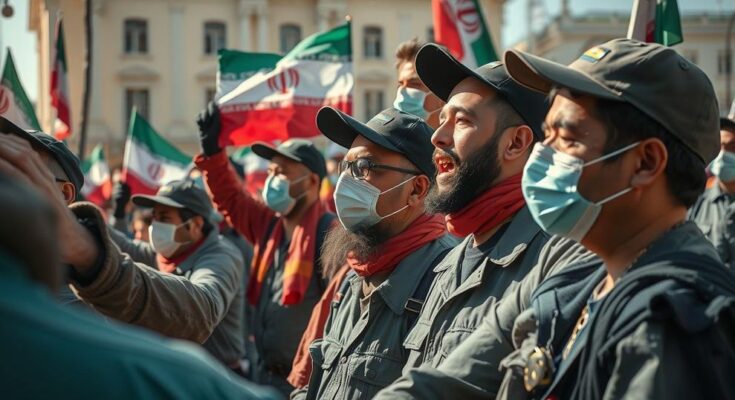On January 13, Iranian labor organizations and retirees condemned the government’s anti-labor policies, warning of a worsening crisis for workers. They criticized insufficient wage increases that fall behind living costs, calling for adjustments based on actual expenses. The statement highlights the growing discontent among the working class, urging unity against governmental repression. With the economic situation deteriorating, collective action is deemed crucial to address these urgent labor issues.
On January 13, several labor organizations and retirees in Iran issued a unified statement denouncing the government’s detrimental anti-labor policies, which they believe have increasingly alienated workers and wage earners throughout the nation. The joint statement warned of worsening conditions and the looming crisis facing the working class, highlighting that the Iranian regime’s policies were fundamentally misguided and harmful. Among the organizations that signed the statement were the Haftapeh Sugar Cane Workers Union, the Coordinating Committee to Help Establish Labor Organizations, and various retired workers from Khuzestan Province.
The statement made clear that the Iranian working class is crucial to the nation’s production, asserting that workers are the “producers of the major wealth of society,” and that the economic machinery functions largely due to their labor. The signatories expressed strong concern regarding the government’s wage policies, describing them as significantly inferior to previous years and warning that ongoing suppression of wages will exacerbate the current crisis, threatening to plunge society deeper into despair.
Wages, as the primary income source for the working class, should reasonably correspond to the actual cost of living for families in urban areas, as dictated by Article 41 of Iran’s Labor Law. This law specifies that minimum wages must be determined based on inflation and the monthly living costs. However, the signatories alert that the government’s wage calculations are fundamentally flawed; while official estimates for the monthly cost of living in major cities hover between 32 and 37 million tomans, they argue that the actual figure for a family of four in 2024 is around 40 to 45 million tomans. Presently, the minimum wage for married workers with children is only 11 million tomans, with many earning even less.
Inflation and housing costs are severely undermining the ability of workers to subsist. Omid Nasibi, a member of the Parliament’s Councils and Internal Affairs Commission, confirmed the plight of the working class, stating that “In the current inflationary conditions, the working class is unable to meet the cost of housing rent and livelihood.” He suggested that even if salaries increased by 50%, it would not substantially improve living conditions unless inflation were addressed.
The government’s recent plan to implement a 20% salary increase for employees next year, alongside a potential 30% rise for workers, appears inadequate given projections that the monthly cost of living could soar to 55 to 60 million tomans by 2025. Consequently, the Iranian workforce is among the lowest-paid globally compared to neighboring countries, a fact exacerbated by skyrocketing inflation and rising living costs.
The labor organizations have criticized the regime for neglecting these pressing issues, asserting that anti-labor policies have diminished its support among workers. They emphasize the need for solidarity among all oppressed groups, including teachers, retirees, youth, women, farmers, and medical workers, to collectively confront government policies.
Protests have surged in recent years as workers, teachers, pensioners, and other wage earners increasingly voice their frustrations with the regime’s economic policies, often demanding better wages and working conditions. Despite intensified unrest, the regime has resorted to security measures aimed at stifling protests, but social movements argue that governmental repression has failed to silence the discontent of the working class.
As Iran’s economic crisis continues to deepen, marginalized groups are mobilizing to assert their rights. The joint statement from various labor organizations underscores an urgent call for unity and collective action, warning that without intervention, the nation risks further socio-economic disintegration. With living costs consistently outpacing wage increases, the Iranian regime is under increasing scrutiny from the very individuals essential for sustaining its economy; the persistent demonstrations reflect not just economic hardship but a profound discontent with policies that have rendered the working class vulnerable.
The ongoing labor unrest in Iran has revealed deep-seated issues concerning wages, inflation, and government policies that have adversely impacted the working class. The rising cost of living juxtaposed with stagnating wages has driven workers to organize and express their grievances, leading to a clearer understanding of the broader socio-economic tensions within the country. Labor laws, designed to safeguard workers’ rights, have not been adequately implemented, leading to widespread disparities in income and living standards.
In conclusion, the situation for Iranian workers and retirees has reached critical levels due to the government’s persistent anti-labor policies and inadequate wage increases. As inflation continues to rise and living costs skyrocket, the urgent need for fair compensation has become increasingly evident. The joint statement from labor organizations serves as a collective cry for action and solidarity among all affected groups, highlighting that without systemic change, the socio-economic stability of Iran is at significant risk.
Original Source: irannewsupdate.com




